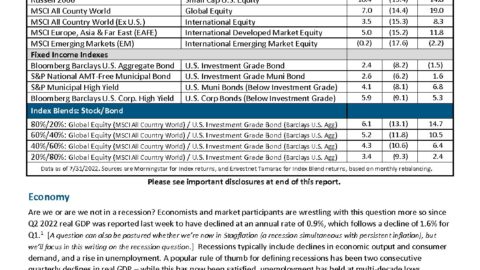Then comes the baby in the baby carriage…
Written by: Allie DeYoung, Financial Advisor, CFP®, CPA
Exciting! You’ve started a family. So, in addition to managing minimal sleep, new schedules to get used to, and finding how to buy MORE non-iron work shirts (because who has time for that?), you have a new financial situation to manage. Your little bundle of joy will be off to college before you know it…and the earlier you start to save the better. However, at the end of the day, there is only a certain amount of money left each month, so you will need to determine the appropriate amount to save for college while also saving for retirement, repaying debt, etc. Just remember, when it comes down to it, there are options for paying for college tuition: student loans, scholarships, grants, etc. With retirement funding, there are no such options—you either work longer or cut expenses. Before just socking money away on a monthly basis for college savings, make sure to have your full financial plan moving in the right direction. Parents, like any other investors with a specific goal, need a strategy.
Common college savings…
First option: 529 savings plan. Most states offer a 529 savings plan. In Colorado, ours is offered through Legg Mason mutual funds and is called Scholar’s Choice or CollegeInvest. These plans offer state tax deductions for contributions. So, if you contribute $10,000 to the plan, you will receive a state tax deduction of 4.63% (CO Income tax rate), so a tax benefit of $463 that year. The contributions are not federally tax-deductible, however. The major benefit is the fact that the gains on the investments in a 529 plan are not subject to tax so long as the funds are used for college expenses. If not, the gains are taxable and a 10% penalty may apply.
Over the years, I’ve found that many parents are familiar with 529 state college savings plans; however, what a lot of parents don’t realize is that this is not their only option. Depending on your current tax situation, timeline, and money available to invest, there may be other options.
Another investment idea to consider…
If you and your family have significant taxable income, you may want to consider a municipal bond zero coupon. This type of municipal bond is sold at a discount to par and matures at par value on a stated date. Instead of bi-annual interest payments, like a traditional municipal bond, the interest accrues each year until it matures at par value. It is an individual bond with a stated yield to maturity, so it is predictable—you know what you’re getting from a return perspective, unlike a stock portfolio. From day one, you know the return until its maturity date (assuming the bond is held to maturity and the municipality stays afloat).
This is not a college-specific investment, so there are no requirements around what the dollars are ultimately used for. This is beneficial in case your children decide not to go to college or other needs arise. An additional benefit for investors is that the interest earned on the municipal bond zero coupon is exempt from federal income tax. These bonds may provide returns that are more predictable and appealing on a net basis than comparable taxable securities.
The best strategy, depends on you…
Every family is different. Start by establishing the total amount you want to allocate to college savings. From there evaluate all of your different investment options, including 529 state college savings plans, municipal bond zero coupon, and also taxable accounts to determine which is most appropriate for you and your family. Once you have your plan in place, you can focus on more important things, like helping your son or daughter pick a major- – anything from Accounting to Adventure Education (which is an actual major by the way…where was that when I was in college?!).
The information contained in this report does not purport to be a complete description of the securities, markets, or developments referred to in this material. The information has been obtained from sources considered to be reliable, but we do not guarantee that the foregoing material is accurate or complete. Any information is not a complete summary or statement of all available data necessary for making an investment decision and does not constitute a recommendation. Any opinions are those of Allie DeYoung and not necessarily those of Raymond James. Every investor’s situation is unique and you should consider your investment goals, risk tolerance, and time horizon before making any investment. Prior to making an investment decision, please consult with your financial advisor about your individual situation. Investors should carefully consider the investment objectives, risks, charges, and expenses associated with 529 plans before investing. This and other information about 529 plans is available in the issuer’s official statement and should be read carefully before investing. Investors should consult a tax advisor about any state tax consequences of an investment in a 529 plan. You should discuss any tax or legal matters with the appropriate professional.
Higgins & DeYoung Wealth Strategies: An Independent Firm | 12303 Airport Way, Suite 145, Broomfield CO 80021 | 720.287.0918
Securities offered through Raymond James Financial Services, Inc., Member FINRA/SIPC.








